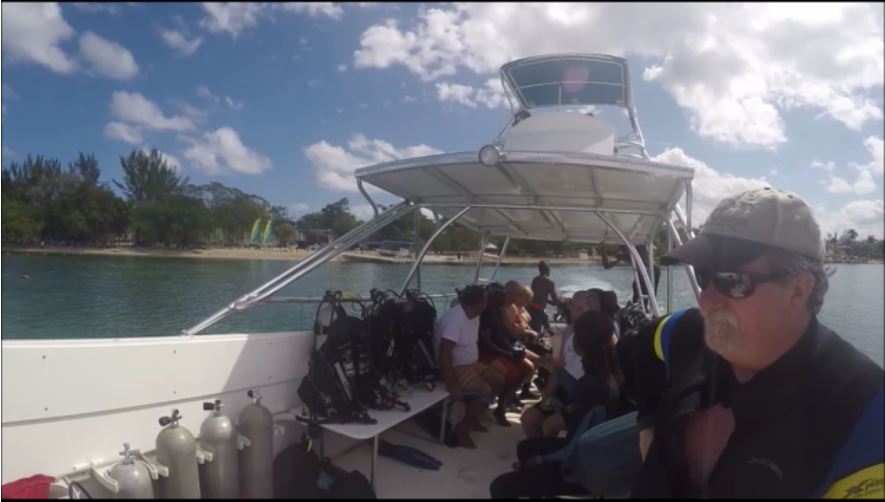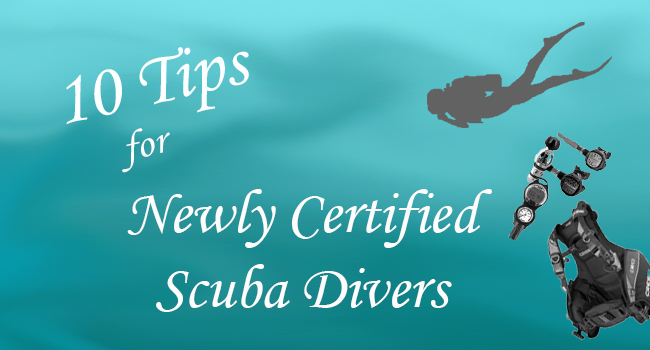There is a lot to remember when you become a newly certified SCUBA diver. Your very first Open Water dive will be both scary and exciting. The more you read and the more dives you do will help in making your dive experiences more comfortable, safe, and fun.

Here are 10 tips I wish I read before my first dive.
Tip 1 – Search for a Good Dive Center
Search for a dive center with a good reputation. The last thing you want is a fly-by center that doesn’t care about their divers. Make sure they service their rental equipment regularly and have spare parts and equipment on board the dive boat.
Tip 2 – Remember to take Motion Sickness Remedy
If you suffer from motion sickness, don’t forget your remedy. I keep a travel tube of Dramamine in my dive mask case. It is a good practice to take it at least 30 minutes prior to boarding a boat or airplane.
Tip 3 – Take Sinus Medication
If you have trouble equalizing your ears, taking a sinus medication such as Sinutab or Sinex helps. Take this along with your motion sickness remedy. I keep a few tablets in my mask case also.
Tip 4 – Take Extra Time to Check Gear
A newly certified SCUBA diver and all divers should always take extra time to check their equipment and their dive buddy’s equipment. A second look by someone else will reduce the risk of missing something. Here is a pre-dive equipment check and set up guide.
Tip 5 – Remember the Smaller Tasks
Remember to:
- treat your dive mask with a defogging solution
- zip your wetsuit if wearing one
- put your weight belt on and make sure it is secure
- put on your fins
- add air to your BCD
- make sure your mask on properly
- place your regulator in your mouth
Tip 6 – Hand-Over-Hand When Descending on a Rope
WARNING!! If you ever descend on a line, DO NOT, I repeat DO NOT slide your hand on the rope. Switch hands or just let go and grab hold again. If you slide your hand on the rope, you will get cuts from whatever has grown on the rope like barnacles and such.
You won’t realize you have cuts until you’re out of the water. If this happens, make sure to wash your hands right away to get rid of any bacteria.
This post has been converted to a video and is available on my YouTube channel.
Tip 7 – Control Your Breathing and Buoyancy
Take a deep breath and relax before entering the water. Learning to control your breathing as a beginner takes some practice. Once you master this skill, your dives will be much more enjoyable and your buoyancy will be better controlled. You will not need as much weight on your belt either.
Tip 8 – Do Not Touch Marine Life
Do not touch or disturb marine life. This could be dangerous and can result in injury or death. There are dangerous things underwater that you may not recognize or even see, so DO NOT touch anything.
Tip 9 – Be Familiar with Your Equipment
Knowing how all of your scuba gear works is important. If a problem arises, you want to know how to respond quickly without guessing what to do.
Tip 10 – Be Aware of Your Health
Being aware of how your body is feeling is something taught during your certification course. You should always take this into consideration before diving.
Emergencies underwater take more time to respond to. Learn Self-Reliance – you can’t help others if you can’t help yourself first.
I hope these tips help to make your diving experience worry-free and fun.
Read about my experiences during my first open water dive as a newly certified SCUBA diver in this post.

